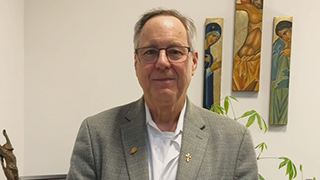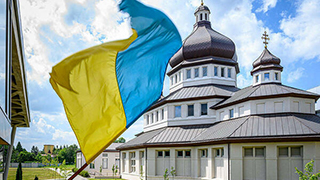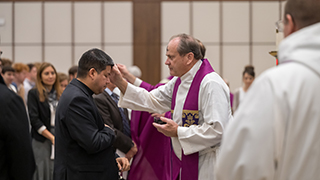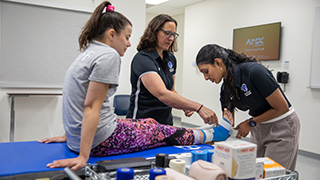Unconquered Smiles during COVID-19 - Seton Hall University
Thursday, May 21, 2020
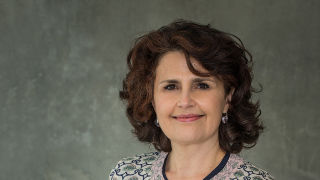
"Smiles come naturally and instinctively; one cannot learn to smile the same way one learns to ride a bicycle or to skate. Reading smiles on people's faces can lead one deeper into understanding their actions and even their souls. The temperature of the body and soul are revealed in a smile in an almost immediate revelation.
A smile was constant on St. Mother Teresa's face, even when she was going through the dark night of the soul. Mother paid special attention to smiling and being joyful, and she required her sisters to smile abundantly. One of the resolutions she made during the 1956 retreat, and in which she persevered during her entire life, was to smile at God. Smile more tenderly, pray more fervently and all the difficulties will disappear, she insisted. Many scholars have asked the question: What was in Mother's smile, or what made her keep smiling for fifty years while going through an unusually prolonged spiritual darkness?"
Bur how can one smile wearing a facemask? Dr. Murzaku offers an answer:
"… one does not smile with the mouth alone, for the whole face is engaged in a real smile. The sparkle Mother had in her smiling eyes never faded away. Angelo Cardinal Comastri told a personal story of Mother Teresa that has to do with her smiling eyes. The cardinal remembers Mother participating in a celebration of profession of new religious sisters in a Roman parish, when a photographer was bothering Mother by taking flash pictures right in front of her face. The cardinal intervened, asking the photographer not to bother Mother by taking pictures when she was praying. The photographer responded rather bluntly by saying that Mother Teresa was not attractive, but her eyes were the happiest that he had ever seen. How, the photographer wondered, this was possible? Cardinal Comastri was shocked by the comment and at the end of the celebration, he repeated to Mother what the photographer had commented about her eyes. To his great surprise and with her usual wit she responded: 'My eyes are happy, because my hands have dried many tears. Try it, I can assure you that works like this.'
The great poet and philosopher Dante Alighieri (1265-1321) reflected on the smile
and smiling, and on how expressive one can be using the eyes. Dante made "the smile" (Sorriso
– noun and sorridere – the verb to smile) the hallmark of his work, and the reflection
on the topic of smile marked one of Dante's original contributions to Christian art,
poetry, and iconography, as well as to Christian and theological imagination. Smile
accompanied Dante in his journeys toward the beatific vision of God as he was journeying
through Inferno and Paradiso.
Until the middle of the thirteenth century, people in ecclesiastical circles argued
about whether or not Christ had ever smiled during his life on earth. Yes, "Jesus
wept" (Jn 11:35), but did he really smile? For Dante, the soul operates principally
in two places or through two windows both located in people's faces: the eyes and
the mouth. It is through these two 'balconies,' as he called them, that people reveal
their souls: the gaze in the eye when people gaze at them intentionally and in the
mouth through the sweet smile. He asks in The Convivio:
What is laughter if not a coruscation of the soul's delight – that is, a light appearing outwardly just as it is within? … She reveals herself in the eyes so clearly that the emotion present in her may be recognized by anyone who gazes at them intently. (Book 3, chapter 8)
Obviously, by wearing a face mask, the mouth will be impaired in making any expressions. What will remain to us in a post-pandemic world, at least for a while, will be the eyes, and the deep dive one will be eager to take through the window of a person’s eyes to discern and understand the soul."
Dr. Murzaku concludes her article on a smiley note:
"The hope for academia is that by September, we will be able to return to normal, to face-to-face classes on campus. Students will return and flock to what have now become ghost campuses. Maybe by then we will not be required to wear face masks, but even if the face mask will be a requirement, I hope that I will have learned to read people's faces and give a smile with my own eyes. The pandemic can never destroy or conquer human relations; it cannot atrophy our smiles. With face masks or without, I will continue to smile big any and every time, hoping to share some light from my soul with all I meet."
View the full version of the article.
About the Catholic Studies Program:
The Catholic Studies Program at Seton Hall University offers an innovative, interdisciplinary
curriculum for students of any creed who are interested in deepening their knowledge
of Catholicism's rich intellectual tradition and living heritage. Combining the study
of history, philosophy, theology, literature, art, sociology, and other disciplines,
Catholic Studies focuses on the church's dialogue with culture and encounter with
the world. Students interested in Catholic Studies have the option to pursue a major,
minor, or certificate that complements and enhances the University's other degree
programs and fields of study.
Categories: Faith and Service



